




One of the common concerns when it comes to leaving a washing machine outside is whether rain can cause damage to it. Rain is a natural element that can bring both advantages and disadvantages. While rainwater can be used to wash away dirt and stains, it can also pose a threat to your washing machine.
Exposing a washing machine to rain can potentially damage its electrical components. Water can seep into the machine and cause short circuits, leading to malfunction or even complete breakdown. Additionally, rainwater can also cause rust and corrosion on the metal parts of the machine, further compromising its functionality and lifespan.
It is highly recommended to protect your washing machine from rain by keeping it indoors or finding a suitable shelter for it. This will help to prevent potential damage and prolong the life of your appliance. If you don’t have space inside your home, consider covering the washing machine with a waterproof cover or tarp to shield it from rainwater.
“Prevention is always better than cure.”
By taking proactive measures to protect your washing machine from rain, you can ensure that it remains in good working condition and avoid unnecessary repair or replacement costs. Remember, a little extra effort in safeguarding your appliance can go a long way in maintaining its longevity and efficiency.
Will Rain Damage a Washing Machine if It’s Left Outside?
Leaving a washing machine outside in the rain can potentially cause damage to the machine and affect its performance. Rainwater can seep into the machine and reach sensitive electrical components, leading to short circuits and malfunctions. Additionally, moisture can cause rust and corrosion, which can further impact the machine’s functionality and lifespan.
Water Damage
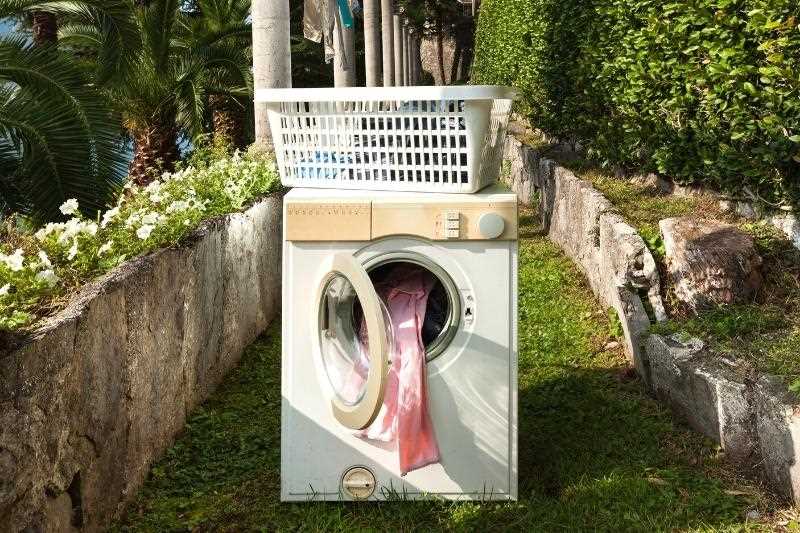
When exposed to rain, water can penetrate through the exterior of the washing machine and seep into the internal components. This can pose a risk to the electrical system, as water and electricity do not mix well. Water damage can lead to short circuits, which can cause the machine to stop working or malfunction.
Rust and Corrosion
Rainwater can also cause rust and corrosion on metal parts of the washing machine. This can affect the smooth operation of various components, such as the drum, motor, and belts. Rust can cause friction and wear, leading to increased noise and reduced performance.
Moisture and Mold
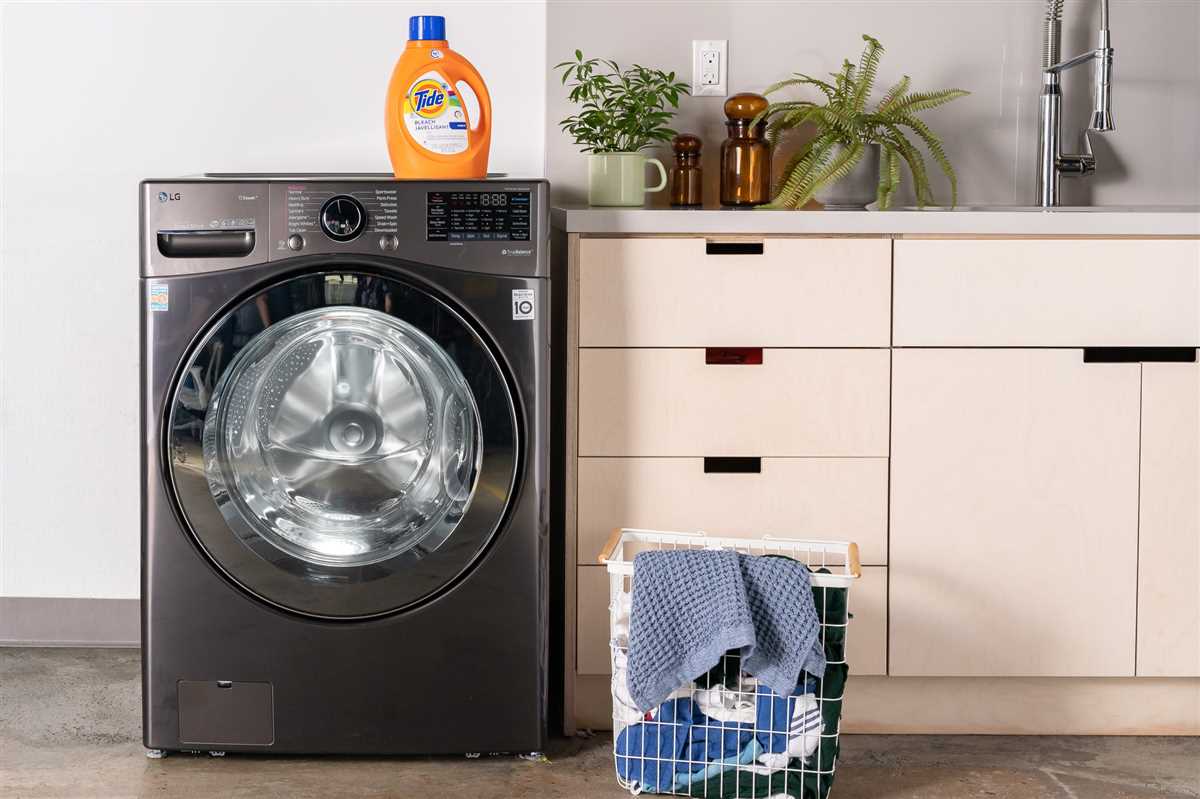
Exposing a washing machine to rain can create a moist environment, which is ideal for mold growth. Mold can develop on internal parts of the machine, including the drum, hoses, and filters. Apart from affecting the cleanliness of the clothes being washed, mold can also cause foul odors and pose a health risk.
Reduced Lifespan
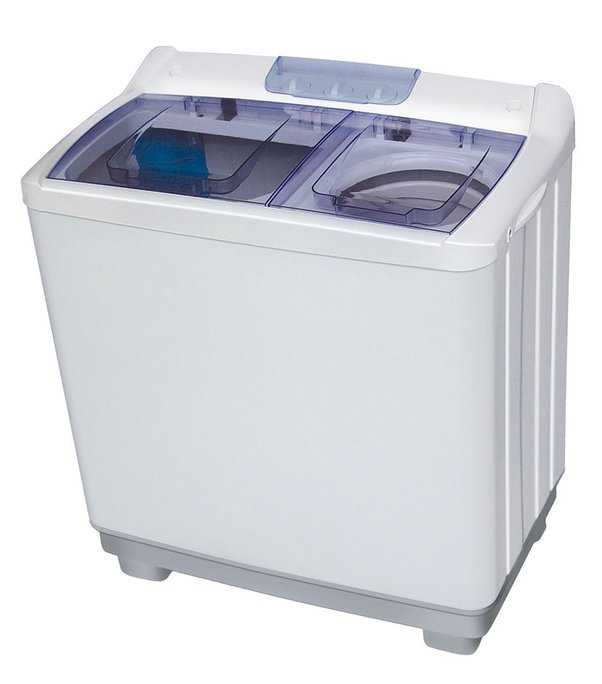
Leaving a washing machine outside in the rain regularly can significantly reduce its lifespan. The combination of water damage, rust, and mold growth can lead to frequent breakdowns and the need for costly repairs. If not addressed promptly, the accumulated damage can render the machine irreparable.
To protect your washing machine from rain damage, it is best to keep it indoors in a dry and sheltered area when not in use. If you do not have space indoors, consider using a waterproof cover specifically designed for washing machines. Regular maintenance, such as cleaning and inspecting the machine, can also help prevent and identify any potential damage caused by rain or moisture.
| Pros of keeping the washing machine indoors: | Cons of leaving the washing machine outside: |
|---|---|
|
|
Understanding the Potential Risks
Leaving a washing machine outside during rain can pose several risks that may cause damage to the machine. It is essential to understand these risks to avoid any unnecessary expenses or repair work.
1. Water damage:
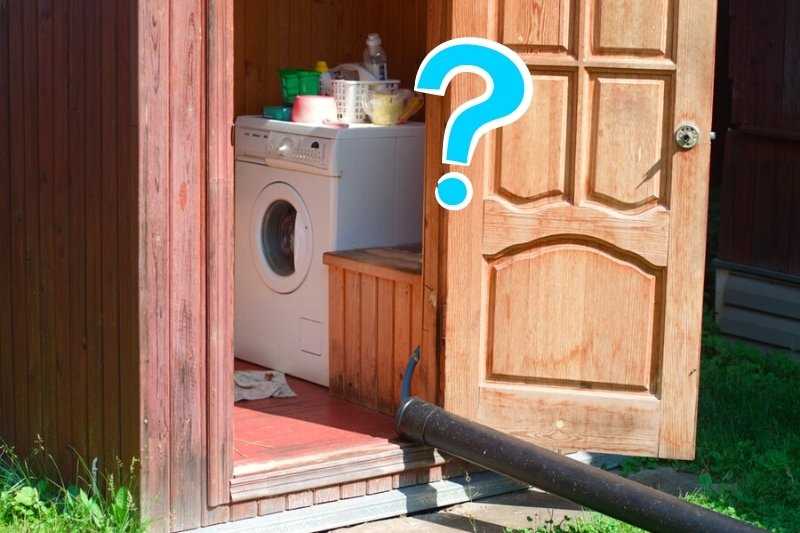
One of the most significant risks of leaving a washing machine outside during rain is water damage. Rainwater can seep into the machine’s electrical components, causing short circuits and malfunctioning. This can lead to costly repairs or even render the machine unusable.
2. Rust and corrosion:

Exposure to rainwater can cause rust and corrosion in the washing machine’s metal parts, such as the drum, tub, and motor. Rust can weaken these components and eventually lead to breakdowns or leaks. Corrosion can also affect the machine’s structural integrity and lifespan.
3. Mold and mildew:
If left outside in a damp environment, a washing machine can become a breeding ground for mold and mildew. These microorganisms can grow on the machine’s surfaces, including the rubber seals and detergent drawer. Mold and mildew can cause unpleasant odours and affect the cleanliness of your laundry.
4. Sun damage:
In addition to rain, sunlight can also damage a washing machine left outside. Prolonged exposure to the sun’s UV rays can cause fading, discoloration, and deterioration of the machine’s plastic or painted parts. The machine’s control panel and display may also become damaged or less readable.
5. Vandalism and theft:
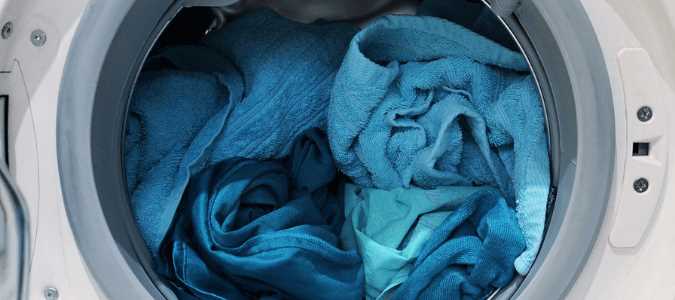
Leaving a washing machine unattended outside can make it an easy target for vandalism or theft. Opportunistic individuals may try to tamper with the machine, causing damage, or even steal valuable components.
To protect your washing machine from these risks, it is recommended to keep it indoors or in a covered area, such as a garage or laundry room. If outdoor storage is unavoidable, consider using waterproof covers specifically designed for washing machines.
How Rain Can Affect the Exterior
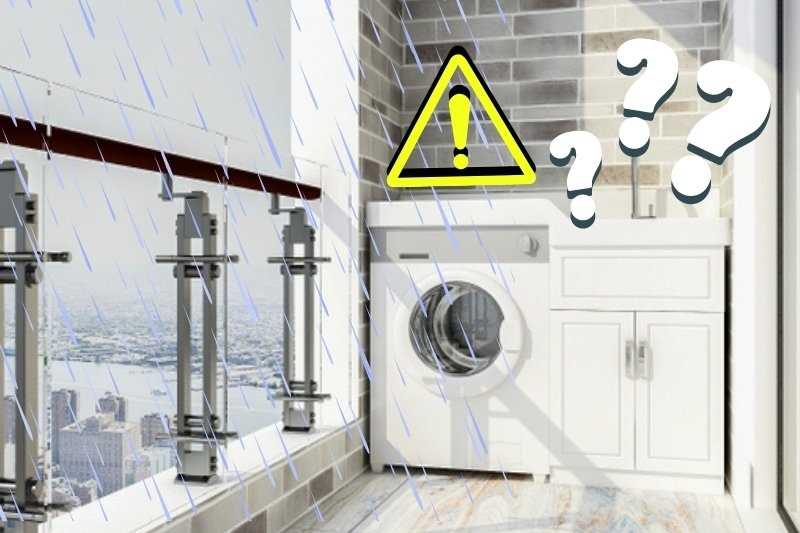
When a washing machine is left outside and exposed to rain, it can experience several issues that can affect its exterior. Here are some ways rain can damage the exterior of a washing machine:
- Rust: Rainwater contains minerals and pollutants that can cause rust to form on the exterior metal parts of a washing machine. Over time, this rust can weaken the structure and lead to corrosion.
- Paint damage: Continuous exposure to rain can strip away the protective paint coating on the exterior of a washing machine. This can lead to the formation of scratches, peeling, and ultimately, a worn-out appearance.
- Electrical damage: If rainwater seeps into the electrical components of a washing machine, it can cause short circuits and damage. This can result in malfunctioning of the machine and may even pose a safety hazard.
- Cracks and leaks: Constant exposure to rain can cause the plastic or rubber parts of a washing machine to degrade. This can result in the formation of cracks, gaps, or leaks, which can compromise the functionality of the machine and potentially cause water damage.
It is important to note that washing machines are designed for indoor use and are not built to withstand prolonged exposure to outdoor elements such as rain. Therefore, it is highly recommended to keep your washing machine in a protected area, such as a laundry room or garage, to prevent potential damage.
The Impact on Internal Components
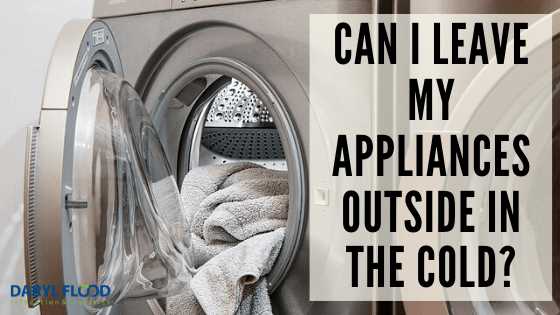
When a washing machine is left outside in the rain, it can have a significant impact on its internal components. Although most modern washing machines are designed to be water-resistant, prolonged exposure to rain can still cause damage.
1. Electrical Components:
The electrical components of a washing machine are particularly susceptible to damage from water. Rainwater can seep into the machine through any cracks or gaps, reaching the electrical circuitry. This can lead to short circuits, power failures, or even complete malfunction of the machine.
2. Rust and Corrosion:
Rainwater contains minerals and impurities that can cause rust and corrosion on the metal components of the washing machine. Over time, this can weaken the structural integrity and affect the performance of the machine. Rusty components may also stain or damage the clothes being washed.
3. Mold and Mildew:
Moisture from the rain can create a damp environment inside the washing machine, promoting the growth of mold and mildew. These fungi can accumulate on the drum, seals, and other parts of the machine, leading to foul odors, staining, and potential health hazards.
4. Mechanical Parts:
Continuous exposure to rain can also impact the mechanical parts of the washing machine. Water can cause the lubricants to break down, leading to increased friction and wear on the moving components. This can result in noisy operation, decreased efficiency, and eventually, mechanical failure.
5. Control Panel:
The control panel of the washing machine is another vulnerable area when exposed to rain. Water can infiltrate the buttons, knobs, and display, causing them to malfunction or become unresponsive. This can make it difficult or impossible to operate the machine properly.
Overall, leaving a washing machine outside in the rain can cause significant damage to its internal components. It is always advisable to protect the machine from exposure to rain and harsh weather conditions to ensure its longevity and proper functioning.
Preventive Measures to Keep Your Washing Machine Safe
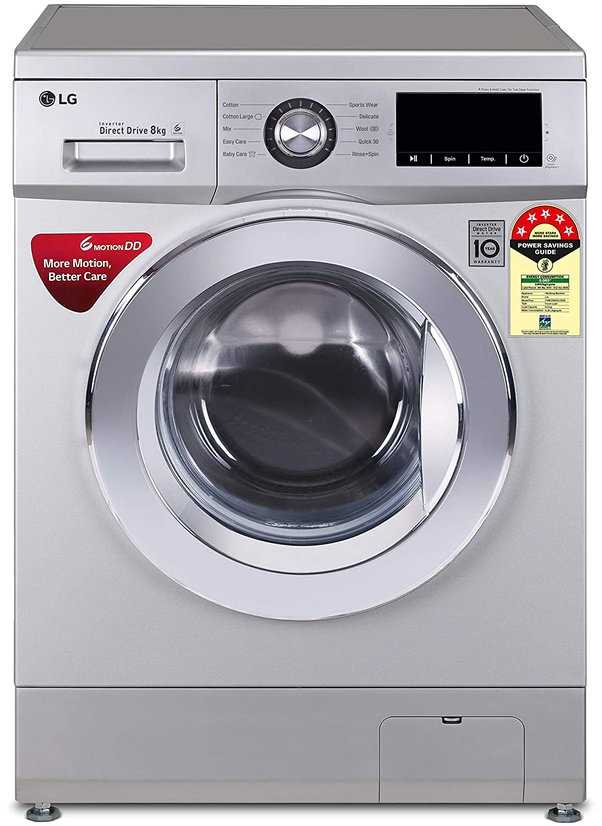
While leaving your washing machine outside during rain can potentially damage it, there are a few preventive measures you can take to keep it safe:
1. Provide a Protective Cover
Invest in a waterproof cover specifically designed for washing machines. This will help protect your machine from rain, snow, and other outdoor elements.
2. Build or Purchase a Shelter
If you frequently leave your washing machine outside, consider building or purchasing a small shelter to provide additional protection. This can be a simple roofed structure or a dedicated laundry room with proper ventilation.
3. Install a Drainage System
Ensure that your washing machine has proper drainage in place. This will allow the water from rain or any other source to flow away from the machine and prevent it from being damaged.
4. Elevate the Machine
Place your washing machine on an elevated surface to protect it from potential water accumulation during heavy rain. This can be a platform or a sturdy stand that keeps the machine off the ground.
5. Regularly Inspect and Maintain
Perform regular inspections of your washing machine to identify any signs of damage or wear. Additionally, follow the manufacturer’s maintenance guidelines to keep your machine in optimal condition.
6. Store Indoors When Not in Use
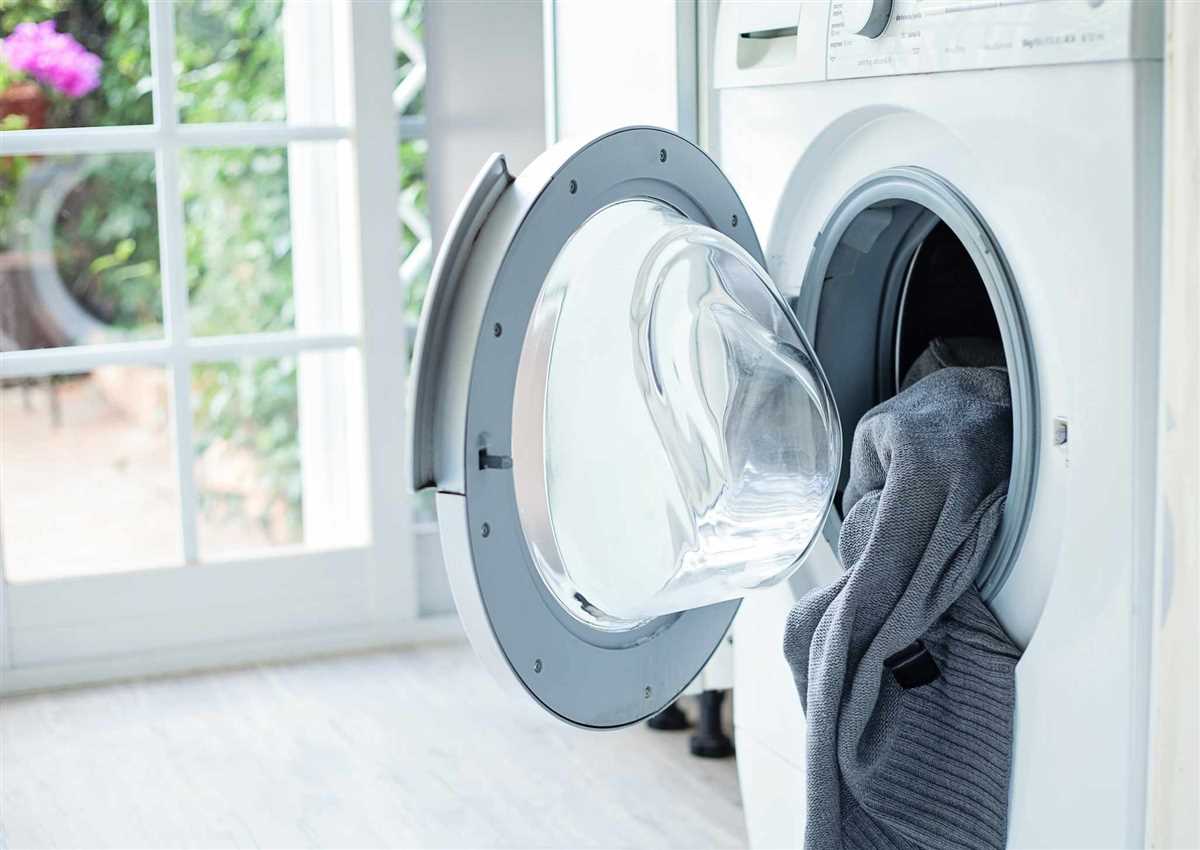
If possible, store your washing machine indoors when it’s not in use. This will help protect it from the damaging effects of rain, extreme temperatures, and other weather conditions.
By taking these preventive measures, you can ensure that your washing machine remains safe and functional even when exposed to rain and other outdoor elements.
FAQ
Can I leave my washing machine outside if it’s raining?
Leaving your washing machine outside during rain can potentially damage it. Rainwater can seep into the electrical components and cause short circuits, leading to expensive repairs or even rendering the machine unusable.
What are the risks of leaving a washing machine outside in the rain?
Leaving a washing machine outside in the rain exposes it to the risk of water damage. The rainwater can penetrate the inner workings of the machine, causing corrosion, rust, and electrical issues. It is best to keep the washing machine in a dry and protected place to avoid these risks.
How can rainwater damage a washing machine?
Rainwater can damage a washing machine in several ways. It can seep into the electrical components, causing short circuits and rendering the machine inoperable. Additionally, the water can cause corrosion and rust on the metal parts of the machine, leading to reduced efficiency and eventual breakdown.
What precautions should I take to protect my washing machine from rain?
To protect your washing machine from rain, it is important to keep it in a dry and covered area. If you have to leave it outside temporarily, make sure it is covered with a waterproof tarp or a washing machine cover. Also, ensure that the power cord and any other electrical connections are properly insulated to prevent water from entering.
Is it safe to use a washing machine that has been exposed to rain?
If your washing machine has been exposed to rain, it is advisable not to use it immediately. Water may have seeped into the electrical components, posing a risk of electric shock or short circuit. It is best to have a professional inspect the machine and carry out any necessary repairs before using it again.
Can I leave my washing machine outside in the rain?
No, leaving your washing machine outside in the rain can cause damage. The rainwater can penetrate the machine and affect its electrical components, leading to potential malfunctions and even short circuits.











